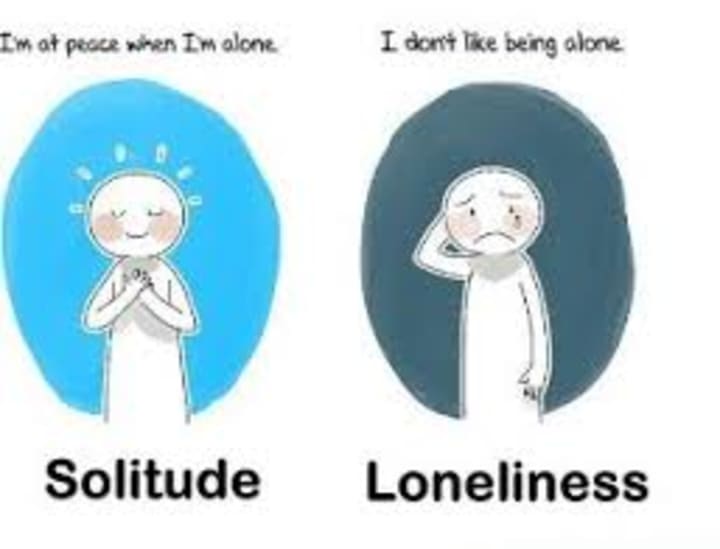THE ART OF BEING ALONE
How Solitude Can Help You Grow Personally And Professionally

Introduction
Being alone is often seen as a negative experience, associated with loneliness, isolation, and even depression. However, being alone can also be a positive and transformative experience. Solitude can provide us with the opportunity to reflect, rejuvenate, and grow personally and professionally.
In this article, we will explore the art of being alone and the benefits it can bring. We will discuss the difference between loneliness and solitude, the benefits of solitude for personal growth, and the ways in which solitude can help us in our professional lives. We will also provide practical tips for how to embrace solitude and make the most of your alone time.

Loneliness VS. Solitude
Before we dive into the benefits of solitude, it is important to distinguish between loneliness and solitude. While these two concepts may seem similar, they are actually quite different.
Loneliness is the feeling of sadness or emptiness that comes from feeling disconnected from others. It is a negative emotion that can have serious physical and mental health consequences, including increased risk of depression, anxiety, and cardiovascular disease.
Solitude, on the other hand, is the state of being alone without feeling lonely. It is a positive and intentional choice to be alone, and it can provide a wide range of benefits.

Benefits of Solitude for Personal Growth
Solitude can provide a multitude of benefits for personal growth, including:
1. Increased Self-Awareness: When we are alone, we have the opportunity to tune out the noise of the outside world and focus on our own thoughts and feelings. This can help us to gain a deeper understanding of ourselves, our values, and our goals.
2. Improved Creativity: Solitude provides us with the time and space to be creative without distractions. We can brainstorm, daydream, and experiment with new ideas without worrying about what others will think.
3. Reduced Stress: Spending time alone can be a great way to reduce stress and anxiety. It allows us to slow down and take a break from the constant stimulation of modern life.
4. Increased Productivity: Without the distractions of others, we can focus more effectively on tasks and be more productive. This is particularly true for tasks that require deep concentration or creative thinking.
5. Improved Relationships: Paradoxically, spending time alone can actually improve our relationships with others. When we are more self-aware and less stressed, we are better able to communicate and connect with others.
Ways Solitude Can Help You in Your Professional Life
Solitude can also be beneficial for our professional lives. Here are just a few ways that solitude can help you in your career:
1. Increased Focus: Solitude allows us to concentrate on the task at hand without distractions. This can be particularly helpful for complex or creative projects that require deep concentration.
2. Improved Decision Making: When we are alone, we can reflect on our options and make decisions without the influence of others. This can lead to more thoughtful and strategic decision making.
3. Enhanced Creativity: Without distractions or interruptions, we can tap into our creativity and come up with new ideas and solutions.
4. Improved Time Management: Spending time alone can help us to prioritize our tasks and manage our time more effectively. We can plan our schedule without the pressure of others’ expectations.
5. Better Self-Care: Solitude provides us with the opportunity to recharge and take care of ourselves. This can help us to avoid burnout and maintain our energy and motivation in our professional lives.

Tips for Embracing Solitude
If you are interested in embracing solitude, here are a few practical tips to help you get started:
1. Start Small: If you are not used to spending time alone, start by carving out just a few minutes each day for solitude. You can gradually increase the amount of time you spend alone as you become more comfortable.
2. Find a Quiet Place: Choose a quiet place where you can be alone without distractions. This could be a park, a library, or a quiet room in your home.
3. Turn off Technology: In order to fully embrace solitude, it is important to disconnect from technology. Turn off your phone, computer, and any other electronic devices that might distract you.
4. Engage in a Creative Activity: Use your alone time to engage in a creative activity, such as writing, drawing, or painting. This will help you to tap into your creativity and gain the benefits of solitude.
5. Reflect on Your Goals: Take some time to reflect on your personal and professional goals. Use your solitude to plan how you will achieve these goals and what steps you need to take to get there.
6. Practice Mindfulness: Mindfulness is the practice of being fully present in the moment. Use your solitude to practice mindfulness by focusing on your breath or the sensations in your body.
7. Take a Solo Trip: Consider taking a solo trip, whether it is a weekend getaway or a longer vacation. This can be a great way to fully embrace solitude and gain the benefits of solo travel.
Conclusion
In conclusion, the art of being alone is a powerful tool for personal and professional growth. While it may seem intimidating at first, solitude can provide us with the opportunity to reflect, rejuvenate, and grow in ways that are not possible when we are constantly surrounded by others. By embracing solitude and making the most of our alone time, we can tap into our creativity, reduce stress, improve our relationships, and achieve our personal and professional goals.
About the Creator
Sukriti gupta
If you are looking for insightful and informative content on a wide range of topics, then you have come to the right place. I'm excited to share my insights on topics such as personal growth, nature, history, stories and much more.






Comments
There are no comments for this story
Be the first to respond and start the conversation.